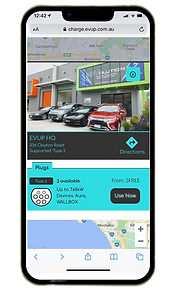
Commercial EV charger hardware options
Commercial charging hardware can be a complex topic, loaded with EV jargon, so we welcome you to give us a call if the information on this page isn't making sense!
Broadly, there are three hardware types to consider when talking about commercial EV charging hardware:
Depending on your commercial application - apartment buildings, workplaces, Government sites, shopping centre and public car parks - we'll talk you through which of these options will best suit, and future-proof, your EV charging infrastructure and needs.
Basic destination chargers
Intelligent & connected destination chargers
DC fast chargers
Basic destination EV chargers - up to 22kW
As the name suggests, a basic destination charger is a slow charge unit located at a site that is a destination for the EV driver; shopping centres, cinemas or sports facilities for instance.
Basic destination chargers are perfect for a simple, reliable and robust top-up charge. They're cost effective to buy, install and commission, they look appealing, are easy to use and require very little maintenance. In addition, they'll attract EV owners to your destination as they can top up the battery while enjoying a coffee, shopping or the gym.
When installed as a universal unit (without a cable, which is now standard industry practice), basic destination chargers are also compatible with every BEV (battery electric vehicle) and PHEV (plug-in hybrid electric vehicle) currently on sale in Australia and New Zealand.
Of course, there are some benefits and disadvantages to basic destination chargers, including:
Please note that, while Tesla HPWCs are free hardware for your destination, installing only these types of charger pretty much alienates drivers of different model EVs (such as Nissan LEAF, Outlander PHEV, BMW i3s, among others). Therefore, we recommend you consider a mix of chargers, or a dual port universal charger that is compatible with all EVs on the Australian and New Zealand market.
Think basic destination charging is right for your site? Give us a shout and we'll get it organised for you!

Tesla HPWC

GARO Wallbox
PROS:
- Lower cost to buy and install...just add power
- Simple, robust and reliable
- No IT connectivity or support needed
- Zero admin / run costs other than electricity
CONS:
- No monitoring
- No access control
- No metering or billing
- No load management needed
Glen Innes Council EV charging installation - attracting tourism to town.
Woden Shopping Centre - tethered Cylon units averaging 20 charges per month (and growing)
Glen Innes Council EV charging installation - attracting tourism to town.
Woden Shopping Centre - tethered Cylon units averaging 20 charges per month (and growing)
Intelligent, connected destination EV chargers - up to 22kW
While similar to a basic destination charger, these units have additional software intelligence that is highly desirable for some commercial businesses and locations.
An intelligent, connected destination EV charger will provide the EV owner with a great, robust top up, and we know from previous experience that EV drivers change their shopping, gym and other habits to favour locations with this type of facility.
What it also adds is a level of intelligence that will be an important data and revenue asset to your site.
These EV chargers such as the Zappi above when connected to management software such as UpCharge can be remotely managed and monitored, giving you real time data about users frequency and usage, as well as allowing for easy troubleshooting in the unlikely event something goes offline.
They can also be monetised, giving your site a revenue stream measured in either an amount per kWh or as a flat fee; and yes, we have the software to assist you to collect and manage those transactions.
And finally, these EV charging units can be load managed, which is imperative for multi-charger locations to avoid overloading, and to manage your site energy consumption.
We can help you install an intelligent, connected destination EV charger at any commercial site - highway routes, petrol stations, shopping centres, gyms, wineries and restaurants - quickly and affordably.
We're proud to have worked with numerous Councils and businesses to plan and deploy intelligent, connected destination EV chargers. Using a project management framework, we'll work with you to engage all stakeholders and create a smooth quote, consult and install process to meet your timeframe, budgetary and connection requirements.
Does intelligent, connected destination EV charging sound right for your site? Get in touch and we'll get it organised for you!
CONS:
- Increased commissioning cost
- Resilient internet connectivity required
- Ongoing run/subscriptions cost
PROS:
- Provides great usage transparency
- Easy charge-back (to consumers) for electricity usage
- Load management is usually an option



+
Walhalla Star Hotel GARO Wallbox - first EV charge points in Baw Baw Shire.
ChargeAmps AURA - part of a national roll-out of EV charging for JAX Tyres.
DC fast chargers - up to 350kW
The charger all EV drivers want access to!
While the AC chargers we use for basic destination charging and intelligent connected destination charging are cost effective and robust, they are also restricted by the on-board components of the electric vehicles they're connected to.
In their most basic form, DC fast chargers connect directly to the EV battery and provide a fast charge; roughly 0 to 80% in around 30 minutes. With figures like these, it's easy to see why most EV owners are keen to have a DC fast charger in their neighbourhood.
Tritium Veefil


As with intelligent connected destination chargers, our DC fast chargers provide user data using software, developed in-house by the EVolution team.
This means your DC fast charger can be monitored and monetised, allowing you to access real time and historic data, as well charge a per kWh or flat fee to users. We can also control load management requirements, ensuring your site isn't overloaded and allowing you to manage energy consumption.
It's important to note that continuous DC fast charging is not always optimal for electric vehicles, which is why we recommend a mix of slower AC charging along with these units. You can read more about why a mix of slow and fast charging is best for electric vehicle battery management here.
As with all commercial EV charging options, there are a number of benefits and challenges with DC fast charging:
PROS:
- The fastest type of charge available
- Ideal for transit routes
- Very attractive draw card for most EV customers
- Easy charge back for electricity usage
CONS:
- May require infrastructure upgrades
- Not all PHEVs or EVs can use this charging method
- Significantly more expensive to buy & install
- Internet connectivity required
- Ongoing run, subscriptions & maintenance costs
Our team are experienced project managers, so will work with you to engage all stakeholders for your site's DC fast charging project. In addition, we aim to create a smooth and consultative quote and installation process, using our nation-wide network of qualified and safety-compliant installers.
If you're interested in DC fast charging for your site, please get in touch and we'll get it organised for you!






